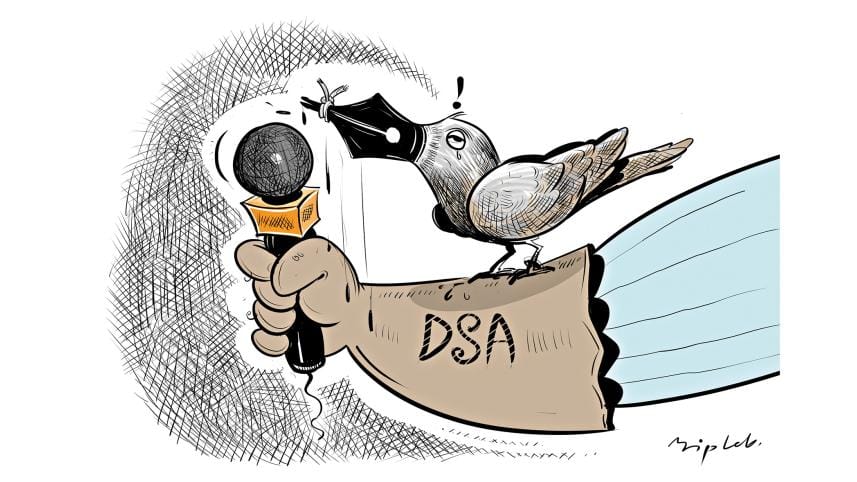A case against the Digital Security Act 2018

The Digital Security Act (DSA) of 2018 was preceded by the controversial Information and Communication Technology Act 2006 (later amended in 2013). Even though the DSA was enacted to ensure digital security and identification, suppression and trial of offences committed through digital devices, various provisions of the Act are being used to suppress the freedom of expression of the people.
Freedom of expression has been guaranteed as a fundamental right under article 39 of the Constitution of the People's Republic of Bangladesh. Even though the provision imposes several restrictions, such restrictions must be reasonable and subjected to judicial review. The right to freedom of expression has also been guaranteed under article 19 of the International Covenant on Civil and Political Rights (ICCPR), which Bangladesh has acceded to in 2000.
Section 8 of the DSA empowers the Director General of the Digital Security Agency and law enforcement agencies to block or remove information in digital media if it threatens 'digital security'. This extremely vague provision creates scope for censorship for the independent press. Section 21 of the DSA states that if any person is involved in making any kind of propaganda or campaign against our liberation war of 1971, the spirit of liberation, the national anthem or the national flag, such person shall be punished with imprisonment for a term not exceeding 10 years and if it is done repeatedly, shall be punished with imprisonment for life or a fine of Tk 3 crore. Such provisions are not only vague in terms of imposing content-based restrictions but also in providing disproportionate penalties.
Section 25 of the DSA criminalises the transmission and publication of any offensive, false or threatening information with an intention to affect the image or reputation of the country or to spread confusion, which again is too wide to be justified by any domestic or international standard. Section 31 again criminalises the intentional publishing or broadcasting of any digital format, which will destroy 'communal harmony'. These vague and wide terms bring a chilling effect on the freedom of expression on matters of public concern.
Section 53 provides that offences specified in sections 17, 19, 21, 22, 23, 24, 26, 27, 28, 30, 31, 32, 33 and 34 shall be cognizable and non-bailable. This gross criminalisation violates the right to liberty guaranteed under article 9 of the ICCPR which protects the right to liberty and security of a person and provides that 'it shall not be a general rule that persons awaiting trial shall be kept in custody.' At the same time, section 53 undermines one of the cardinal principles of criminal law, i.e., the presumption of innocence. Article 9(3) of the ICCPR allows pre-trial detention as an exception, but in the DSA, pre-trial detention has become a norm.
Some of the recent DSA cases show a bizarre pattern: the accused is first forcibly disappeared, and then shown arrested under the Act, which is a clear violation of the directives given by the Supreme Court of Bangladesh in the BLAST and Others v Bangladesh & Others case (decided on 24 May 2016) and the Torture and Custodial Death (Prevention) Act 2013.
In Douglas v Jeanette 319 US 157 case, the Supreme Court of the United States opined that freedom of speech and expression is not confined to any particular field of human interest but guarantees the broadest exercise of the right for religious, political, economic, scientific or informational ends. In Schacht v US 398 US 58, the court found that the right to discuss public affairs includes the right to criticise the government including its defence policy and the conduct of the armed forces. In Hector v AG of Antigua and Barbuda (1990) 2 All ER 103, 106, in the words of Lord Bridge of Harwich, '[i]n a free democratic society, it is almost too obvious to need stating that those who hold office in government, and who are responsible for public administration must always be open to criticism. Any attempt to stifle or fetter such criticism amounts to political censorship of the most insidious and objectionable kind.'
Lastly, in the case of State of Bihar v Sailabala AIR (1952) SC 329, it is mentioned that advocacy of a certain political ideology cannot be restricted on the ground of security of state unless it is accompanied by the use, or threat, of violence. Such cases show that the current trend in democratic societies all around the world is to expand the ambit of freedom of expression as much as possible.
The DSA is not only limited to criminal charges and detentions but also hinders the implementation of many fundamental rights, including freedom of movement, freedom of thought, conscience, and opinion, right to life, and freedom of religion and belief. It is high time we made necessary reforms to the DSA.
The Writer is an Official Contributor, Law Desk, The Daily Star.



 For all latest news, follow The Daily Star's Google News channel.
For all latest news, follow The Daily Star's Google News channel.
Comments